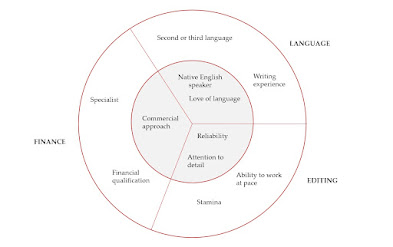What to Look For In an Editor
What makes a good editor?
Here are some of the qualities and skills that make a good editor:
Native English. Far more people in the world speak English as a second language than as a first.
It is tempting therefore to think that simply having a high level of English is sufficient for an editor.
However, the English language has a richness and depth that can only be fully grasped if steeped in it since infancy.
This means that editors for whom English is not their native language will lack the proficiency and instinctive grasp of the language that native English speakers possess.
Love of language. Natural editors have a deep appreciation and love of language. They love to read, often speak a second or third language and may have writing experience themselves.
This affection manifests itself in their editing.
They highly value accuracy, clarity and integrity in the written word and derive great satisfaction from improving and crafting it, drawing out the intended meaning with skill and care and delivering clean, clear copy.
Editing is not just something that they do; it’s who they are.
Reliability. High-quality editors are able to turn around copy at pace consistently to a high standard. In high-volume departments, stamina is essential to be able to work long hours.
Attention to detail. The best editors are adept at both spotting howlers on the front page and saving your blushes at the bottom of page 19.
Commercial approach. Financial research editors understand the pressures analysts are under and that delivering a clear message is the most important function of the note.
They therefore don’t enforce rules for rules’ sake, they appreciate analysts and firms have their own styles and understand that sometimes research just has to get to market immediately.
The best editors are able to do what it takes to get research to market under pressure without sacrificing quality.
Specialist vs generalist. Financial research is highly specialised and can be very technical. It is preferable therefore to choose specialist financial research editors over generalists (who also edit say science or general finance) as they will understand the content much better.
Specialists are more likely to add value in the questions they ask of the analyst and in the changes they make. They are also less likely to subtract value by asking irrelevant questions or changing the meaning. Often they possess financial qualifications, eg a FINRA licence.
For more information visit: https://researcheditors.co.uk/
Here are some of the qualities and skills that make a good editor:
Native English. Far more people in the world speak English as a second language than as a first.
It is tempting therefore to think that simply having a high level of English is sufficient for an editor.
However, the English language has a richness and depth that can only be fully grasped if steeped in it since infancy.
This means that editors for whom English is not their native language will lack the proficiency and instinctive grasp of the language that native English speakers possess.
Love of language. Natural editors have a deep appreciation and love of language. They love to read, often speak a second or third language and may have writing experience themselves.
This affection manifests itself in their editing.
They highly value accuracy, clarity and integrity in the written word and derive great satisfaction from improving and crafting it, drawing out the intended meaning with skill and care and delivering clean, clear copy.
Editing is not just something that they do; it’s who they are.
Reliability. High-quality editors are able to turn around copy at pace consistently to a high standard. In high-volume departments, stamina is essential to be able to work long hours.
Attention to detail. The best editors are adept at both spotting howlers on the front page and saving your blushes at the bottom of page 19.
Commercial approach. Financial research editors understand the pressures analysts are under and that delivering a clear message is the most important function of the note.
They therefore don’t enforce rules for rules’ sake, they appreciate analysts and firms have their own styles and understand that sometimes research just has to get to market immediately.
The best editors are able to do what it takes to get research to market under pressure without sacrificing quality.
Specialist vs generalist. Financial research is highly specialised and can be very technical. It is preferable therefore to choose specialist financial research editors over generalists (who also edit say science or general finance) as they will understand the content much better.
Specialists are more likely to add value in the questions they ask of the analyst and in the changes they make. They are also less likely to subtract value by asking irrelevant questions or changing the meaning. Often they possess financial qualifications, eg a FINRA licence.
For more information visit: https://researcheditors.co.uk/



Comments
Post a Comment